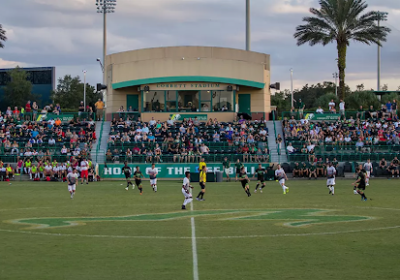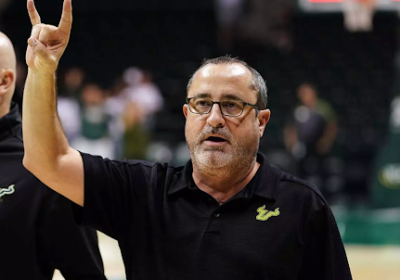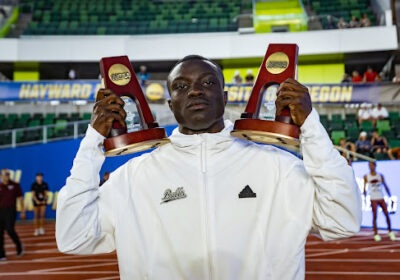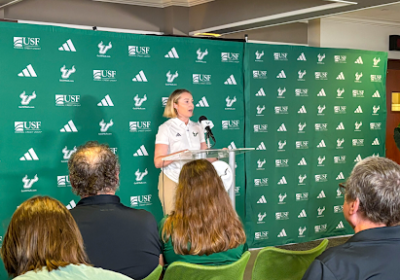Love remains after Antigua-Calipari reunion

USF’s Orlando Antigua spent five years as an assistant at Kentucky. ORACLE PHOTO/ROBERTO ROLDAN
MIAMI — As the buzzer sounded one final time Friday night, Orlando Antigua turned away from his bench and began to walk to his right down the side of the court.
It was a trip he had made countless times before as USF’s men’s basketball coach. But this one was unlike any other.
No, USF wasn’t celebrating a monumental upset over top-ranked Kentucky. The Wildcats easily dispatched the Bulls 84-63 in the HoopHall Miami Invitational.
But on this day, the final score took a backseat to the emotions at American Airlines Arena.
Waiting halfway down the line in front of the scorer’s table was the man to whom Antigua owes much of his coaching success. The man he spent five seasons observing from the next seat over, absorbing information from every nook and cranny to get where he is today — Kentucky coach John Calipari.
As the two met halfway, they shook hands. Calipari then leaned in to Antigua’s ear.
“He said our guys competed in the second half,” Antigua said. “He was proud.”
After spending the 2008-09 season together at Memphis, Antigua helped Calipari mold Kentucky back into a perineal winner. Behind Antigua’s recruiting prowess, the Wildcats were able to land future NBA superstars in John Wall, DeMarcus Cousins, Anthony Davis and Karl-Anthony Towns among others.
Their third season together in Lexington in 2012, Kentucky won the national championship. They also teamed up for three Final Four appearances.
Since Antigua left for his first college head coaching position at USF in March 2014, the two have continued to speak regularly. But despite the fanfare and national-television analysis surrounding their meeting for the first time as opponents, it was a game that neither truly relished.
In their discussions leading up to the game, Antigua said the topic was never something they brought up until game day.
“Whenever he plays against any of his former assistants or former players, it’s hard,” Antigua said.
Despite being overpowered by Kentucky’s skill, speed and sheer ability up and down the court, Bulls (2-5) hung around early. They even pulled within six points on a long 3-pointer by freshman guard Jahmal McMurray with a little more than six minutes remaining.
Reality, however, soon settled in and everything unraveled from there.
USF shot just 30 percent in the first half. A game-defining 23-2 run also blew things open after McMurray’s shot as Kentucky star Skal Labissiere showed off with a couple of crowd-pleasing alley-oop dunks.
But Calipari had reason to be proud of his star pupil.
In the second half, the Bulls settled in and rebounded to shoot 46 percent the game. They never quit. They never stopped fighting. A 31-point deficit midway through was chiseled down to 21 when everything was said and done.
“This was one where you’ve got to give Orlando credit,” Calipari said. “His team never quit. They got down 30 and all of a sudden you turn around and they’re still fighting.”
It’s going to be a building process for Antigua at USF, that much is understood. But Calipari knows what that is like.
As an up-and-coming coach at UMass in the late 1980s, Calipari’s Minutemen went 10-18 and 14-17 in his first two seasons. By the time he departed to take over the New Jersey Nets in 1996, UMass had made five straight trips to the NCAA Tournament.
With a depleted roster, Antigua won nine games last season. This year, the Bulls are off to their worst start since opening 1-6 under Bobby Paschal in 1987-88.
“Those are the kind of jobs that it takes time,” Calipari said. “It takes one or two, three classes to come together. And then you see it.”
On Friday, Antigua saw many familiar faces. During pregame introductions, a hearty blue-clad crowd gave him a resounding applause.
Then, it was business as usual.
“When you’re away from the competitive energy of things, you just feel those guys that you spent and were able to create a lot of great memories with and I’ve got some great friendships with the staff and those players,” Antigua said. “It was a lot of love. Then, the ball goes up and it was just competing. Just playing basketball like you would as a kid on the court yourself as a player and as a coach.
“It was nothing different.”








